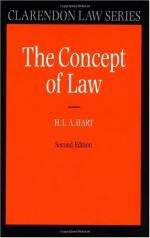|
This section contains 691 words (approx. 2 pages at 400 words per page) |

|
Chapter 7, Formalism and Rule-Skepticism Summary and Analysis
General rules, standards and principles are the primary forces of social control in any society; individual directions cannot be given for everything. The law, therefore, refers to classes of persons and classes of acts and things. Legislation tends to focus on maximal classes and precedent on minimal classes. Communication invariably involves class-terms of all shapes and sizes and these classes are often demonstrated with indeterminate examples.
The authoritative quality of general rules is sometimes exaggerated precisely because their contours and boundaries are hard to define; the boundaries are left up to interpretation, but interpretation cannot eliminate the uncertainty. We must ultimately make arbitrary selections of interpretations of rules. We are often ignorant of facts and have unclear aims. This is the vice of legal formalism or conceptualism; these philosophies of law minimize and obscure indeterminacy...
(read more from the Chapter 7, Formalism and Rule-Skepticism Summary)
|
This section contains 691 words (approx. 2 pages at 400 words per page) |

|




